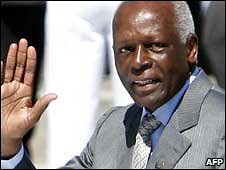
Republic of Angola President Jose Eduardo dos Santos. The southern African state has changed its constitution to have the president elected by parliament as opposed to a direct vote. The oil-rich nation is the largest exporter of oil on the continent.
Originally uploaded by Pan-African News Wire File Photos
SIBONGILE KHUMALO
LUANDA, ANGOLA - Feb 22 2011 08:04
Oil revenues have made Angola one of the fastest-growing economies in Africa, but the high cost of living that has come with the boom makes life difficult for many in the war-weary country.
Angola vies with Nigeria for the title of Africa's largest producer of crude. Oil money has driven an economic boom that saw GDP grow an average 11,2% a year in the decade to 2008.
But the country was left with next to no industry after its 27-year civil war ended in 2002, forcing it to import most of its consumer goods from Europe, China and South America.
Oil wealth has combined with an influx of foreign currency and congestion at the overwhelmed port in the capital, Luanda, to send prices soaring. The inflation rate was 14,5% in 2010.
Astronomical prices in the local kwanza greet customers every time they visit shops. Commuters are sometimes forced to jog to work when Luanda's ramshackle public minibus taxis suddenly increase fares.
Rising fuel costs since a reduction in subsidies are often blamed for the galloping prices. Angola pumps 1,9-million barrels of oil a day but imports 50% of its refined fuel, making the finished product expensive despite the country's large output of crude.
About 86% of Angola's urban population lives in slums, with only intermittent water and electricity. In Luanda, luxury ocean-side villas where expatriates and rich locals live tell a tale of a city battling with a gaping wealth divide.
Oil has attracted an influx of foreign companies that bring with them their own staff who live on high salaries and allowances.
But the pinch of high prices is also felt by top-earning expatriates.
Luanda was ranked the most expensive city in the world for expatriates in a 2010 study by the Mercer consulting firm, ahead of Paris, London and Tokyo.
'There is nothing that we can do'
Nadine, a Lebanese expat who lives in Alvalade, an affluent suburb on the outskirts of the city, pays $10 000 a month to rent a three-bedroom house.
She says she spends about $5 000 a month on groceries to feed her family of four, not including eating out.
"There is nothing that we can do, you just have to pay," she said while pushing her trolley around the upscale Casa dos Frescos supermarket, whose shelves are lined with imported goods ranging from vegetables to bottled water.
Poor Angolans at the bottom of the food chain depend on fishing and street selling to earn a living. There is a booming informal economy that caters to those who can't afford to go to shops.
Sizaltina Cutaia, a grant officer at the Open Society Initiative for Southern Africa (Osisa), said the country needs to re-learn to feed itself.
Cutaia herself earns $4 000 a month but lives in a house with no running water or electricity. She pays a neighbour to connect to his generator and buys 300 litres of water a week from a travelling vendor.
"Angola needs to revive its food production industries, that could help ease the high food prices," she said.
"The country's vast agricultural land is lying dormant. The few players in the industry enjoy a monopoly and that is pushing prices up."
Even relatively well-paid Angolans spend much of their income on food.
Jorge da Cruz (24) works as a clerk at a foreign oil firm. His $850 monthly salary is 10 times the country's minimum wage, but he is far from living a comfortable life in the three-room house he and his family of 10 share in a shantytown outside Luanda.
"Food takes up most of my money, then I have to pay for my daily transport to my evening classes at university," said Da Cruz, who spends $300 a month on night school and uses the rest of his income to support his family.
"It's true Angola is a rich country," he added. "But its people are poor." - AFP
Source: Mail & Guardian Online
Web Address: http://www.mg.co.za/article/2011-02-22-angolas-high-prices-hard-to-bear
No comments:
Post a Comment